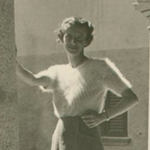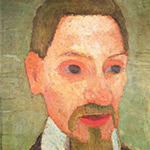Juliana (A mistranslation)
from the Old English
Hear we of these heroes
who love who spread selves
on the grass spread their
selves wide and split
wide their grinning
spin and split
their duties across my split
slit my cross
August that hoarded that honored
his housegods guardians
of my cities consumed by she
who was Juliana. I who ghostbore
highest truth kept clean
that maidenhood married myself
off so eagerly to Christ’s care.
O Father unwitting could not sense
my virginal scheming and fathers make such promises
Firmly fixed
against the lusts of August this hardlocked
abundance and endless earthen gems
I despised all and spoke
before father and this son of summer:
“If I may speak your honored selves
need not be vexed. But know the true
Godlove and open, throats thrumming
hymns to permit Him to penetrate.
May I prick this lock
picked or even slicked
with jam a boyish prank
you may open may soak in
this truth and trust the conditions will be met.”
August’s ire sinstained before
my virgin words barbaric and mindblind
fetched fleet my father.
Warcrying cocked their spears
combined as one and sick with their crimes
one fatherson August, son
of my lands you swordclinging
boy of such brutal mind such
tender selfdom my words such a rigid
spear in rib and Father, oh
how you offer me up.
“Daughter mined for sweetness
dearest heartsafe she, sweetest
anguish amid the light of my eyes,
you grasp at folly own vanity
malevolence you refuse
your interest: he is better than you.”
Fast and firm my fermented desire
a friend meant for no man
unwilling to yield unreachable, even
with such rewards.
“I give no consent to man who cannot grant
the same to our origin shared waves
the whirling track of all the world’s expanse
all which encloses you, bound
to my rightness, a righteous grinding
of zealous touch starved teeth,
things that linger on the tongue speckled with fever.
Your quiver is emptied you cannot be reached.”
Daddy would gift me
with glittering minimum
payments of his seething:
“If I survive and you sustain
this supple dodging of the dearly
disdained your own
you face a death by beast
such things as you would crawl into
my bed to seek my reassurance
that dreams had passed and shriveled
a trace of cortisol left in the blood.”
“My bliss is blunted honesty clubbed
my fear of you, I lack the capacity
to conceive of this conviction.
Your juries will find me unfitted to
these fixtures attempting small adjustments
new dressings for the rack all unconvincing
splintered symptoms of your idolismic delusions.
I would burn these heathen holyfields
before accepting this bargain.”
Father marked his fury uncontained, so common
in purplespecked memories of fathers
and daughters swinging
from his arms swinging his
fists and finding in frozen
breaths before contact a calmness.
These torments allow him access.
Sacred cargo dragged before this dawn tribunal,
watchers gather wonder aloud
at what crimes could commit one so fuckable.
August was first to address the accused:
“My sweetest sun shining schemer,
Juliana! Ho, what a gleam
gifted with grace a budding blossom!
Stupidity does not suit the pluckable,
so simple to pretend
to swallow this succor and sacrifice
to our needs. Our gods ask so little
yet your refusal remains. What awaits
now is agony you cannot comprehend.”
My smile stretched edgedragged
to corners cracked and chapped, dripping
down upon my best-loved bra
while onlookers assess the repetition
of rackwhipped response.
“This is our nation, victory taken
over such stubborn rejection.
Let go of your strife and end this unrest,
hatred brought home with your blasphemy.”
This blame could be borne a weight
awaiting me all nights and lightened
with slattedsun patterns on pillow
cases we would cram with our miserable
memorabilia, you may have believed once
that I could recant.
Bind fast to me satisfied with such
a fate as I know I would warrant
warring with such horrors that waited
scraped into my stone
Hung by my hair from a gym
class pull up bar one hour for each
boy left unfucked
when only my headhair returned shorn I rode
forth from my town on projectile waves
of their bile til I came
to rest—these sandstone hills, ice cream
dollops eastward, house the horny toads
and locusts of my memory.
I watch the passing headlights from this perch
on coals prepared so lovingly
for my soles and cheeks, and down
across the plain the island
of streetlight marks the boundaries of mutual rejection.
A martyr sans mercy her moral
superiority is simply a bitter young cunt
I
would have crushed them all.
Translation Note
This project, a partial translation of The Exeter Book’s Juliana (itself an Old English translation of a Latin saint narrative), began as part of my MFA thesis at Boise State University. Initially, it found inspiration in H.D.’s Helen in Egypt, as one of my aims was a ghostly inhabitation and voicing of a legendary female figure—in this case, St. Juliana of Nicomedia. My translation of Cynewulf’s Juliana seeks to complicate a portrait of a Christian martyr through the excavation of the psychosexual nature of Juliana’s saintliness, her relationship with her father and her betrothed, and her intimate conflict with the devil. One of my primary goals in translating Anglo-Saxon poetry is to preserve a sonic sense of the original language even as my translations seek to speak to contemporary conflicts, frameworks, and concepts.
Woven throughout the translated passages are the more experimental intrusions, functioning as commentary on or response to the Anglo-Saxon. The intrusions also use memories of my queer, rural childhood and adolescence to reframe the narrative. In the early drafting stage, these intrusions were marked by formal distinctions from the direct translations; they featured extremely brief, sometimes single-word, left-justified lines with none of the caesuras that mark the Anglo-Saxon lines. However, as I continued in my translation work, I found that the distinction detracted from the poem’s continuity. Considering the violent nature of the poem, I thought it would be interesting to experiment with some formal “dismemberment” of the text; there are many lines from the original that are left out, altered, or replaced with my own intrusions. While violence is taking place at the level of content, there is also something about the deceptive nature of weaving in the replacement verses without signaling the shift that performs this dismemberment in a more subtle way. What you see here is the first section of a three-part (mis)translation of the entire saint narrative, covering Juliana’s betrothal, via her father, to Eleusias1, her refusal unless Eleusias converts to Christianity, and her subsequent trial and torture. The overall goal of this project is twofold. I wanted to presents readers with a lesser-known Anglo-Saxon poem in such a way that it might appeal to modern poetic tastes while still encouraging the curious to seek out the source text. Secondly, as an intensely personal piece of writing, the act of creating such an experimental translation was a therapeutic exercise in reframing trauma, through which I was able to both laugh at my own exaggerated sense of martyrdom and honor the very real pain and isolation felt by my adolescent self.
1 Eleusias is rendered as “August” in this translation. This is primarily because Eleusias as a name means nothing to most contemporary readers. August is still rooted in the original Latin and more clearly evokes the grandeur of a wealthy, powerful senator. August carries more significance within the context of my thesis as a whole, where the transition from summer into autumn in the month of August, and the subsequent start of a new school year, mark a return to the adolescent social order and the traumas of homophobic bullying and compulsory heterosexuality.
Cynewulf was a 9th-century English poet. Little to nothing is known of him outside of his poems, preserved in the Vercelli and Exeter Books: The Fates of the Apostles, Elene, The Ascension, and Juliana.
Lindsey Appell (she/they) is a poet, fiction writer, and writing instructor currently living in Boise, Idaho. They hold an MA in English from the University of Utah and an MFA in Creative Writing from Boise State University. Raised Catholic in Montana, her poetry explores intersections of landscape, religion, mental illness, and rural queerness.


 BACK TO ISSUE
BACK TO ISSUE













